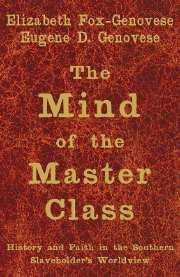Book contents
- Frontmatter
- Contents
- Preface
- List of Abbreviations
- Prologue
- PART ONE CRADLED IN THE STORMS OF REVOLUTION
- PART TWO THE INESCAPABLE PAST
- PART THREE ANCIENT LEGACIES, MEDIEVAL SENSIBILITY, MODERN MEN
- PART FOUR A CHRISTIAN PEOPLE DEFEND THE FAITH
- 13 A Christian People
- 14 Unity and Diversity among the Faithful
- 15 War over the Good Book
- 16 Slavery: Proceeding from the Lord
- 17 The Holy Spirit in the Word of God
- 18 Jerusalem and Athens – Against Paris
- 19 Serpent in the Garden: Liberal Theology in the South
- 20 Theopolitics: Golden Rule, Higher Law, and Slavery
- Coda: St. John of Pottawatamie
- PART FIVE AT THE RUBICON
- Epilogue: King Solomon's Dilemma
- Supplementary References
- Index
16 - Slavery: Proceeding from the Lord
Published online by Cambridge University Press: 05 June 2012
- Frontmatter
- Contents
- Preface
- List of Abbreviations
- Prologue
- PART ONE CRADLED IN THE STORMS OF REVOLUTION
- PART TWO THE INESCAPABLE PAST
- PART THREE ANCIENT LEGACIES, MEDIEVAL SENSIBILITY, MODERN MEN
- PART FOUR A CHRISTIAN PEOPLE DEFEND THE FAITH
- 13 A Christian People
- 14 Unity and Diversity among the Faithful
- 15 War over the Good Book
- 16 Slavery: Proceeding from the Lord
- 17 The Holy Spirit in the Word of God
- 18 Jerusalem and Athens – Against Paris
- 19 Serpent in the Garden: Liberal Theology in the South
- 20 Theopolitics: Golden Rule, Higher Law, and Slavery
- Coda: St. John of Pottawatamie
- PART FIVE AT THE RUBICON
- Epilogue: King Solomon's Dilemma
- Supplementary References
- Index
Summary
The thing proceedeth from the Lord. We cannot speak unto you bad and good.
—Genesis, 23:50“If slavery be thus sinful,” the Baptist Reverend Thornton String fellow wrote in a widely read essay, “it behooves all Christians who are involved in the sin, to repent in dust and ashes, and wash their hands of it, without consulting with flesh and blood.” So said the theologically liberal Unitarian The odore Clapp of NewOrleans. So said the ultra-orthodox Baptist J. R. Graves, who “would lift my voice in thunder tones” against slavery were it proven unscriptural. The Reverend Alfred Watson of the Episcopal Diocese of North Carolina as well as college presidents George Addison Baxter and T. C. Thornton concurred. The Methodist Reverend Thomas Burge of Middle Georgia and the Presbyterian Thomas (“Stonewall”) Jackson of Virginia told their wives they would free their slaves if convinced of the sinfulness of slavery. Our whole struggle, so Linton Stephens wrote to his brother Alexander, turns upon the single issue of slavery as right or wrong. “If it is wrong, everybody ought to do all that can be done, consistently with a prudent regard to circumstances, to abolish it.” An incredulous Episcopalian Reverend Richard Adgate Lipscomb of Alabama asked Frederick Law Olmsted if he really thought Southerners would tolerate slavery if they believed it sinful. The antislavery President Francis Wayland of Brown University, for one, did not doubt the sincerity of Southerners who made such assertions.
- Type
- Chapter
- Information
- The Mind of the Master ClassHistory and Faith in the Southern Slaveholders' Worldview, pp. 505 - 527Publisher: Cambridge University PressPrint publication year: 2005



